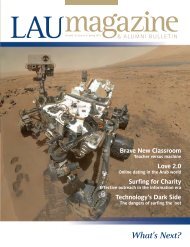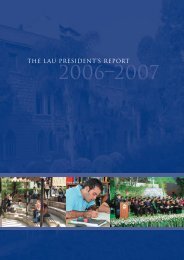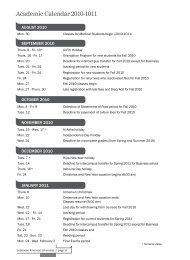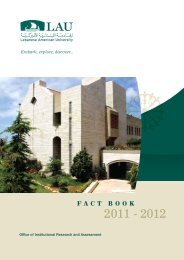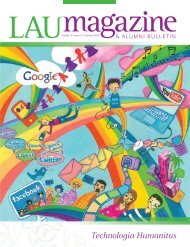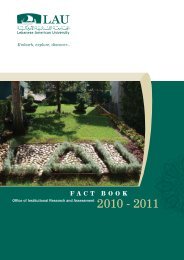academic-catalog2011.. - LAU Publications - Lebanese American ...
academic-catalog2011.. - LAU Publications - Lebanese American ...
academic-catalog2011.. - LAU Publications - Lebanese American ...
You also want an ePaper? Increase the reach of your titles
YUMPU automatically turns print PDFs into web optimized ePapers that Google loves.
Department of Computer Science and Mathematics<br />
Computer Science<br />
programs<br />
MISSION<br />
The mission of the Computer Science Program<br />
is to provide students with the ability to integrate<br />
the theory and practice of computing in the<br />
representation, processing, and use of information<br />
while upholding tradition of the liberal arts<br />
education.<br />
UNDERGRADUATE PROGRAMS<br />
BACHELOR OF SCIENCE (B.S.)<br />
IN COMPUTER SCIENCE<br />
The Bachelor of Science in Computer Science at<br />
<strong>LAU</strong> provides a fundamental understanding of<br />
the theoretical principles of software and digital<br />
systems within the context of current technology.<br />
The program provides students with a strong<br />
background in the fundamentals of mathematics<br />
and computer science, and is balanced between<br />
theoretical and applied courses that prepare<br />
students for a professional career in the area of<br />
computer science. Furthermore, in addition to<br />
developing computer science skills, the program<br />
helps the students obtain an understanding<br />
of the human and social aspects of computer<br />
systems, and how computer science relates to<br />
other disciplines.<br />
EDUCATIONAL OBJECTIVES<br />
The educational objectives of the Bachelor of<br />
Science in Computer Science Program are:<br />
1. Prepare graduates for computer science<br />
related careers, locally and abroad, with<br />
a broad knowledge of the computing field,<br />
related principles, tools, and theories.<br />
2. Develop graduates who are committed<br />
to life-long learning, capable to work<br />
effectively in teams, and who possess<br />
good communication skills.<br />
3. Prepare graduates who are aware of<br />
cultural, social, legal, and ethical issues<br />
inherent in the discipline of computing.<br />
LEARNING OUTCOMES<br />
The outcomes of the Bachelor of Science in<br />
Computer Science Program are:<br />
1. Students shall be able to apply their<br />
computational and mathematical<br />
knowledge in order to solve computational<br />
problems.<br />
2. Students shall develop the ability to analyze<br />
a problem, identify, define, and verify the<br />
computing requirements appropriate to its<br />
solution.<br />
3. Students shall have the ability to design,<br />
evaluate, and implement an efficient and a<br />
correct algorithm, computer-based system,<br />
process, component, or program that<br />
meets desired needs.<br />
4. Students shall learn to work effectively<br />
and interactively in teams in order to<br />
accomplish a common goal.<br />
5. Students shall develop an understanding<br />
of the ethical and social issues related to<br />
computing.<br />
6. Students shall have the ability to effectively<br />
present, transmit, and communicate their<br />
work, written as well as orally, to colleagues<br />
and to clients.<br />
7. Students shall develop the ability to<br />
analyze the local and global impact<br />
of the computing field on individuals,<br />
organizations, and society.<br />
8. Students shall have an understanding<br />
of current technology trends as well as<br />
future directions and shall recognize the<br />
need and develop the necessary skills for<br />
continued professional development.<br />
9. Students shall develop the ability to<br />
use current techniques, skills, and tools<br />
necessary for computing practices.<br />
10. Students shall develop the ability to apply<br />
mathematical foundations, algorithmic<br />
principles, and computer science theory<br />
in the modeling and design of computerbased<br />
systems in a way that demonstrates<br />
comprehension of the tradeoffs involved in<br />
design choices.<br />
11. Students shall be able to model, analyze<br />
and design computer-based software<br />
systems including requirements elicitation,<br />
specification, prototyping, design,<br />
implementation, tradeoffs analysis, testing<br />
and documentation.<br />
12. Students shall develop an understanding<br />
of complexity analysis and various<br />
algorithmic paradigms.<br />
ACADEMIC CATALOG [ 2011-2012 ] SCHOOL OF ARTS AND SCIENCES<br />
105




